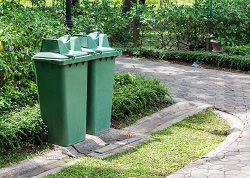Building Future Eco-Warriors Through Recycling
Posted on 10/06/2025
Building Future Eco-Warriors Through Recycling
Empowering the next generation to become environmental champions is crucial in today's rapidly changing world. One of the most effective ways to cultivate eco-conscious citizens is by teaching the fundamental practice of recycling. In this comprehensive article, we delve deep into the importance of recycling education, innovative approaches to nurturing future eco-warriors, and the impacts our collective efforts can have on the planet.
Why Should We Invest in Future Eco-Warriors?
The global environmental crisis has reached a tipping point. With landfills overflowing, oceans brimming with plastic, and natural habitats disappearing, it is clear that sustainable behaviors must be adopted now more than ever. Future eco-warriors, especially the younger generation, have the power to turn the tide against pollution and waste. By focusing on recycling as an entry point, we can create environmentally responsible citizens who proactively contribute to a healthier planet.
Understanding the Role of Recycling in Sustainability
Recycling is the process of converting waste into reusable materials, thereby reducing the need for raw resources and minimizing our environmental footprint. Teaching recycling skills provides a hands-on introduction to broader ecological principles, serving as the cornerstone for other green activities such as composting, upcycling, and sustainable consumption. Integrating recycling initiatives into daily life fosters a sense of responsibility and stewardship for the Earth among children and adults alike.

The Benefits of Developing Eco-Conscious Habits Early
- Environmental Awareness: Guiding children and teens in recycling helps them understand the direct relationship between their actions and environmental outcomes.
- Positive Behavioral Changes: Early exposure to eco-friendly habits such as recycling increases the likelihood of lifelong environmentally responsible behaviors.
- Advocacy and Leadership Skills: Young "green leaders" can inspire their peers and communities, advocating for sustainable practices and meaningful change.
- Skill Development: Sorting, organizing, and repurposing materials enhance problem-solving and critical thinking abilities.
Linking Recycling Education to Broader Environmental Stewardship
Building future eco-warriors through recycling isn't just about reducing waste--it's about fostering empowered citizens who recognize their role in protecting the environment. Recycling programs in schools and communities often serve as the gateway to deeper engagement with topics such as climate change, conservation, and renewable energy.
Innovative Strategies for Nurturing Young Eco-Warriors
Creating resilient environmental champions requires thoughtful, engaging approaches to recycling education. Here's how parents, educators, and communities can cultivate the next generation of green leaders:
- Interactive Workshops: Hands-on experiences allow students to see firsthand the lifecycle of materials and the impacts of proper waste management.
- Recycling Challenges: Competitions and incentives, such as recycling drives and upcycling contests, motivate youth to get involved and think creatively.
- Incorporation in Curriculum: Including recycling lessons in science and social studies curricula reinforces its importance while linking it to real-world issues.
- Community Clean-ups: Organizing collective recycling and litter removal events not only beautifies local areas but also builds teamwork and civic pride.
- DIY Projects: Creative activities using recyclable materials spark innovation and illustrate the value of resourcefulness.
The Role of Technology in Recycling Education
In today's digital age, technology plays a crucial role in recycling education. Interactive apps, online games, and virtual tours of recycling centers give children a deeper understanding of the recycling process from start to finish. These tools make the learning experience fun, accessible, and impactful, reaching a broader audience than ever before.
Community Involvement: A Key To Sustainability Success
Empowering future eco-warriors through recycling is a community-wide endeavor. Parents, schools, local governments, and businesses all have a role to play. By joining forces, communities can establish collection programs, organize public recycling days, and support educational campaigns. The result is a ripple effect--creating systems that make it convenient and rewarding for everyone to recycle and adopt sustainable habits.
How Parents Can Model Eco-Warrior Behavior at Home
- Lead by Example: Children emulate the behaviors they observe. Practicing proper recycling and discussing the reasons behind it encourages kids to do the same.
- Create a Home Recycling Center: Designate clearly-marked bins for paper, plastics, glass, and metals, and involve children in the sorting process.
- Upcycle Together: Turn common household waste into art projects or functional objects to demonstrate the concept of reusing before discarding.
- Communicate the Impact: Share statistics, news stories, and documentaries about environmental problems and recycling successes to build understanding and motivation.
Partnerships Between Schools and Local Businesses
Many successful future environmental leaders start their journeys through school programs that partner with local recycling centers or eco-friendly businesses. Such collaborations often result in field trips, mentorships, guest speakers, and sponsorship for green projects. These experiences expose students to real-world applications of recycling and foster a sense of purpose beyond the classroom.
Challenges and Solutions in Building Eco-Warriors
While enthusiasm for recycling is growing, a few obstacles hinder our progress toward building a generation of dedicated eco-warriors:
- Lack of Awareness or Misinformation: Some communities lack access to accurate information about what can be recycled and the correct methods for sorting materials.
- Insufficient Infrastructure: Not all cities provide curbside pickup or easily accessible recycling drop-off centers.
- Consumer Apathy: The perception that individual efforts are insignificant can demotivate people from participating in recycling programs.
- Cost and Convenience Factors: Where recycling processes are complicated or inconvenient, involvement tends to drop.
Solutions involve a combination of policy changes, public education, and systemic support:
- Clarity and Simplicity: Clear instructions and visual aids make recycling easier to understand and adopt.
- Enhanced Access: Expanding recycling facilities and drop-off points ensures everyone has the means to participate.
- Visible Incentives: Offering rewards for recycling, such as discounts, recognition, or educational credits, encourages ongoing engagement.
- Integration with Other Green Initiatives: Linking recycling with composting, community gardening, and energy reduction projects underscores the broader value of sustainability.
Impact of Early Recycling Habits on Future Generations
There is strong evidence that people who are introduced to recycling at a young age grow into adults who care for the planet. These eco-warriors not only practice sustainable behaviors themselves but also influence friends, family, and colleagues. The snowball effect can be profound--one child inspired to recycle today could become tomorrow's environmental leader, policy-maker, or innovator.
Recycling as a Launchpad for Advanced Environmentalism
Recycling opens the door to a greater understanding of complex sustainability concepts. As children master the basics, they become interested in issues such as energy conservation, water management, and biodiversity. The skills, confidence, and environmental literacy they build through recycling education are invaluable in tackling new ecological challenges in the future.
Case Studies: Schools and Programs Creating Tomorrow's Green Leaders
- Eco-Schools Initiative: A global program that integrates recycling and other sustainable practices into the heart of education. Schools are awarded for their achievements in waste reduction, energy savings, and student engagement.
- RecycleMania: An annual competition among colleges and universities in North America, challenging student bodies to reduce waste and boost recycling rates through fun and educational activities.
- Green Teams: Student-led environmental groups that run recycling drives, conduct audits, and spread awareness throughout their communities, further cultivating leadership qualities.
Success Story: The "Green Warriors" Club
At a public middle school, a group of students formed the "Green Warriors" club. They spearheaded initiatives such as classroom recycling competitions, upcycled art exhibits, and organized field trips to local recycling plants. Their efforts led to a 40% reduction in school waste and inspired neighboring schools to implement similar programs. This case exemplifies how empowering youth can create a lasting positive impact, both locally and beyond.

Actionable Tips for Raising Future Eco-Warriors Through Recycling
- Start Small: Even simple acts like recycling paper or bottles at home set a solid foundation for larger environmental efforts.
- Make it Fun: Gamify the process by introducing points, rewards, or competitions to keep interest levels high.
- Leverage Storytelling: Share stories of famous environmentalists and groundbreaking recycling initiatives to inspire and educate.
- Encourage Advocacy: Support children in presenting recycling ideas to their schools, community centers, or local councils.
- Connect with Nature: Organize outdoor clean-ups or recycling-themed outings to reinforce the connection between waste management and environmental health.
The Path Forward: Shaping a Sustainable Tomorrow
Building future eco-warriors through recycling is not a one-time venture--it's an ongoing commitment that transforms individuals, communities, and the world. By supporting recycling education at home, in schools, and through community engagement, we can spark a movement that brings lasting change. Remember, every can, bottle, and scrap recycled is a step forward in protecting our planet for generations to come.
Join the movement today--help foster future environmental champions and make recycling the cornerstone of a greener, more sustainable future!

 020 3859 5580
020 3859 5580 020 3859 5580
020 3859 5580





 House Clearance
House Clearance Rubbish Collection
Rubbish Collection House clearance in London has never been easier, as Junk Removal Services can take care of your every need. From individual house junk...
House clearance in London has never been easier, as Junk Removal Services can take care of your every need. From individual house junk... With Junk Removal Services you can be confident that you’ll receive the most professional and affordable rubbish collection service within the London...
With Junk Removal Services you can be confident that you’ll receive the most professional and affordable rubbish collection service within the London...




